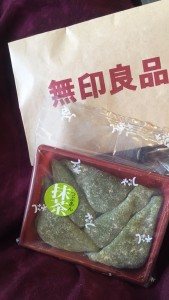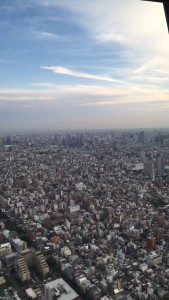Back to the Atlantic
June 14, 2016
Our last day in Japan consisted of a lot of travelling, and during this time, I was able to reflect a lot on the experience I’ve had in this class thus far. Spending my last 500¥ was a very intimate moment between myself and the cashier at Muji, a very high end, minimalistic store in Japan. With 500¥, I was able to buy an eraser, which better be the most flawless eraser of all time.
 My eraser from Muji and some mochi for snacking
My eraser from Muji and some mochi for snacking
Also, I cannot help but mention that on our last morning in Japan, I experienced a 4.9 earthquake, and got completely excited. I know that this reaction is probably not the best to have during an earthquake, but knowing how small its magnitude was and how seismically safe the buildings in Tokyo are, I think my feelings at the time were pretty validated. Growing up in California, I have always been fascinated with earthquakes and plate tectonics in general. Experiencing an earthquake in one of the most seismically active zones on the planet DEFINITELY had me jumping up and down (mentally and quite physically). Not to mention, when I got the notification from one of the many seismic apps on my phone, tears welled in my eyes– a girl’s dream has finally come true.
 I had to screenshot the overlap of my location and the location of the quake so I could look back on the wonderful moment in years to come.
I had to screenshot the overlap of my location and the location of the quake so I could look back on the wonderful moment in years to come.
On the half-day flight, I managed to write some more poetry and such on my experiences in New Jersey and Japan, specifically pertaining to natural disasters (while Three-Mile Island was not necessarily a natural disaster). Through this, I found that many of the people we interviewed were women. Being the only woman in this group, this was not really noticeable to me until one of my colleagues pointed it out, which was quite interesting since I usually notice these patterns when analyzing another person’s research. The women were also mainly mothers that were concerned with the situations at hand. In a previous blog, I mentioned that many families were split up because the concern mothers had did not match up with those of fathers. Similar situations occurred in New Jersey (referring to the mother that left when the evacuation notice was given and the father that stayed), which I did not expect to find in the Japanese response to disaster.
Ultimately, I have realized that the most damage from all of the disasters we have studied have been social and emotional. Since it is too early to tell whether the Fukushima explosions caused radiation-related diseases and the casualties of Sandy and Tohoku have very finite numbers, the amount of families and communities that were and still are affected by these events surpasses the numbers. As a result, economies and local governments are seen as criminal and many communities, both in the United States and Japan. In the future, governments must recognize the potential ethical dilemmas that may rise from ignoring certain populations of people.
 View of Tokyo from the 350th floor of the Skytree
View of Tokyo from the 350th floor of the Skytree
Leave a Reply